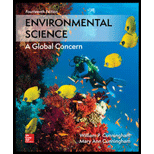
The underlying premises and definitions that shape the arguments based on the warning of ecologists that people are using up irreplaceable natural resources and the response of economists that ingenuity and enterprise would find substitutes for most resources.
Answer to Problem 23.1CTDQ
The ecologists are right on their point when they said that people are using irreplaceable natural resources that are in limited quantities and might get run out of the stock whereas economists responded that most of the resources would be substituted with an alternative in future according to the scarcity of the particular resource.
Explanation of Solution
The irreplaceable natural resources are also known as the non-renewable resources. These resources cannot be renewed again. The examples of irreplaceable or non-renewable natural resources are solar energy, water, oxygen and many more. The finite reserves of the natural resources are depleting day by day due to the effects of pollution. This depletion is a great threat especially for the irreplaceable or non-renewable natural resources because they are not replaceable.
The ecologists have correctly said that people are using those resources which are not replaceable or renewed means if these resources would get over then it would never be available again. Anything which is in limited amounts might get run out of stock and it depends upon the rate of consumption.
Whereas the economists argued that ingenuity and enterprise would find substitutes for most resources. They meant to say that most of the resources would be substituted. It has been a continuous increment in the commodity prices and the hikes in the prices of the commodity are exerting pressure on the companies and consumers to see any other alterative which is relatively cheaper than the costly commodity. For example, the hiked-price of petroleum which is present in the limited quantity and might be its supply would get over after sometime in future due to scarcity. Due to the present situation of oil crisis and hiking fuel prices, many companies and scientists have introduced the concept of solar power and wind energy which might be the possible alternate to petroleum oil if petroleum oil would completely run out of the stock in future.
Want to see more full solutions like this?
Chapter 23 Solutions
Environmental Science
 Applications and Investigations in Earth Science ...Earth ScienceISBN:9780134746241Author:Edward J. Tarbuck, Frederick K. Lutgens, Dennis G. TasaPublisher:PEARSON
Applications and Investigations in Earth Science ...Earth ScienceISBN:9780134746241Author:Edward J. Tarbuck, Frederick K. Lutgens, Dennis G. TasaPublisher:PEARSON Exercises for Weather & Climate (9th Edition)Earth ScienceISBN:9780134041360Author:Greg CarbonePublisher:PEARSON
Exercises for Weather & Climate (9th Edition)Earth ScienceISBN:9780134041360Author:Greg CarbonePublisher:PEARSON Environmental ScienceEarth ScienceISBN:9781260153125Author:William P Cunningham Prof., Mary Ann Cunningham ProfessorPublisher:McGraw-Hill Education
Environmental ScienceEarth ScienceISBN:9781260153125Author:William P Cunningham Prof., Mary Ann Cunningham ProfessorPublisher:McGraw-Hill Education Earth Science (15th Edition)Earth ScienceISBN:9780134543536Author:Edward J. Tarbuck, Frederick K. Lutgens, Dennis G. TasaPublisher:PEARSON
Earth Science (15th Edition)Earth ScienceISBN:9780134543536Author:Edward J. Tarbuck, Frederick K. Lutgens, Dennis G. TasaPublisher:PEARSON Environmental Science (MindTap Course List)Earth ScienceISBN:9781337569613Author:G. Tyler Miller, Scott SpoolmanPublisher:Cengage Learning
Environmental Science (MindTap Course List)Earth ScienceISBN:9781337569613Author:G. Tyler Miller, Scott SpoolmanPublisher:Cengage Learning Physical GeologyEarth ScienceISBN:9781259916823Author:Plummer, Charles C., CARLSON, Diane H., Hammersley, LisaPublisher:Mcgraw-hill Education,
Physical GeologyEarth ScienceISBN:9781259916823Author:Plummer, Charles C., CARLSON, Diane H., Hammersley, LisaPublisher:Mcgraw-hill Education,





